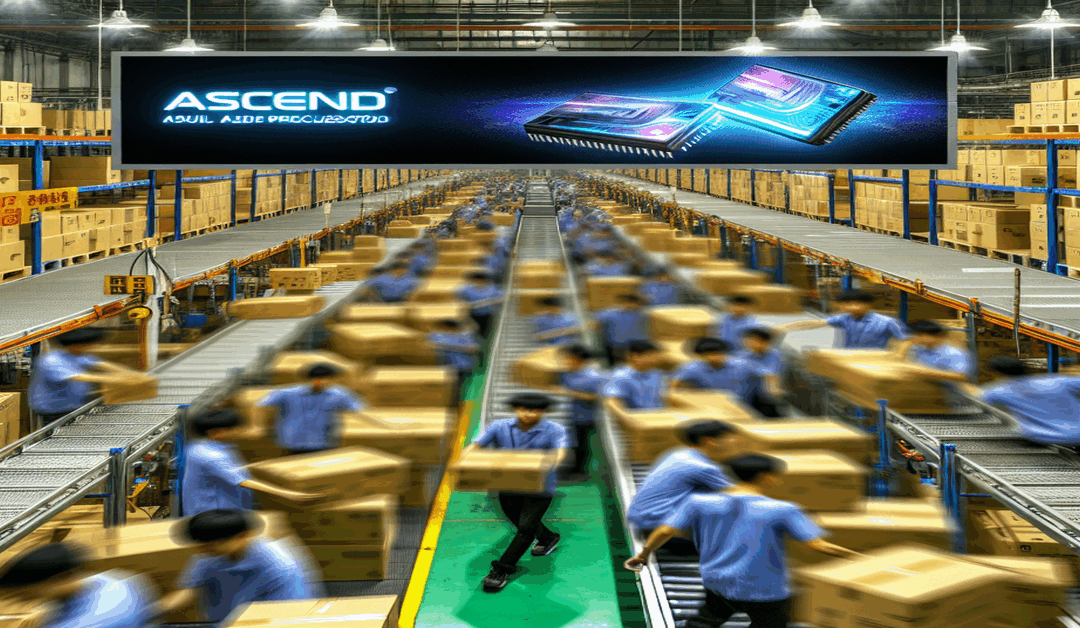Huawei Set to Disrupt AI Chip Market with Ascend 910C Mass Shipments
In a significant development for the AI industry, Chinese tech giant Huawei is gearing up to commence mass shipments of its latest AI chip, the Ascend 910C, to customers in China as early as next month. This move comes amidst U.S. export restrictions on Nvidia’s H20 chip, which have hampered the American company’s ability to sell to Chinese firms. The restrictions, imposed by the U.S. government to curb China’s technological advancements, have created a void in the Chinese AI market that Huawei is now poised to fill.
Ascend 910C: A Domestic Alternative for Chinese AI Developers
The Ascend 910C chip is positioned as a homegrown solution for Chinese AI developers who have been searching for alternatives to Nvidia hardware due to the export controls. By integrating two 910B processors, Huawei’s chip is expected to deliver performance comparable to Nvidia’s offerings, although it still lags behind Nvidia’s latest processors in terms of raw performance and efficiency.
Despite these limitations, the Ascend 910C represents a significant step forward for China’s AI industry. As one industry insider noted, “Huawei’s chip may not be as powerful as Nvidia’s latest offerings, but it’s a solid alternative for Chinese companies that have been cut off from American technology. It’s a testament to China’s growing capabilities in the AI hardware space.”
Implications for the Global AI Supply Chain
Huawei’s move into the AI chip market signals a major shift in the global AI supply chain, potentially leading to a more fragmented AI hardware ecosystem. As China ramps up domestic AI chip production, global enterprises will face challenges related to interoperability, compliance, and strategic planning.
“The rise of Chinese AI chips like the Ascend 910C could lead to a bifurcation of the global AI hardware market,” explained an industry analyst. “Companies operating in China may increasingly turn to domestic suppliers, while those outside of China continue to rely on American firms like Nvidia. This could create challenges for enterprises that operate across borders, as they’ll need to ensure their AI systems can work with a variety of hardware platforms.”
Huawei’s CloudMatrix 384: Competing with Nvidia’s Rack-Scale Solutions
In addition to the Ascend 910C, Huawei is also making waves with its CloudMatrix 384, a rack-scale AI solution built using the new chip. The CloudMatrix 384 competes directly with Nvidia’s offerings, highlighting China’s efforts to develop more self-sufficient AI infrastructure.
“Huawei’s CloudMatrix 384 is a clear sign that China is serious about building its own AI ecosystem,” said a technology journalist covering the story. “While it may not be as advanced as Nvidia’s solutions, it’s a viable option for Chinese companies that want to avoid relying on American technology.”
The Future of AI Hardware: A Brave New World
As Huawei begins mass shipments of the Ascend 910C and other Chinese firms develop their own AI chips, the future of the AI hardware market looks increasingly complex. Global enterprises will need to navigate a rapidly evolving landscape, balancing performance, cost, and geopolitical considerations as they build out their AI infrastructure.
Despite these challenges, the rise of Chinese AI chips also presents opportunities for innovation and collaboration. As one industry executive put it, “The emergence of new players in the AI hardware space could lead to increased competition and faster innovation. It’s an exciting time for the industry, and we’re eager to see what the future holds.”
#AIChips #HuaweiAscend910C #ChinaAI #GlobalAISupplyChain #NvidiaAlternatives
-> Original article and inspiration provided by Opahl TechnologiesFanny Potkin,Che Pan
-> Connect with one of our AI Strategists today at Opahl Technologies

